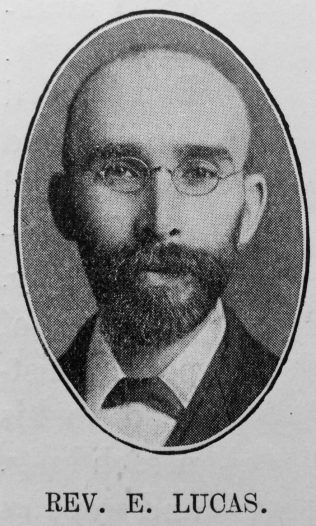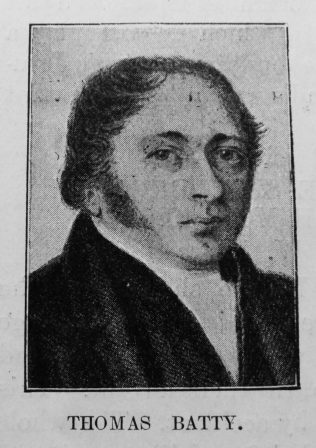Our Centenary - Storming the Villages III.
How Thomas Batty Annexed Weardale




Transcription of Article in the Primitive Methodist Magazine by Rev. Ernest Lucas
The River Wear rises in the north-western corner of the County of Durham, where that county borders on the neighbouring counties of Cumberland and Northumberland. This high moorland region on the summit of the Pennine range is the birthplace of many rivers. At no great distance from each other are the springs of Tyne, Allen, Derwent, Tees and Wear. From Wearhead, where the two streams meet by whose union the Wear is formed, to Wolsingham, is a distance of about sixteen miles. This higher part of the valley of the Wear is called Weardale. A pleasant stream, clear as crystal, winds through green meadows, which gradually rise on either side into swelling, rounded hills, and high moorlands. Meadows and hillsides are everywhere dotted with houses, the dwellings of a hardy race of dalesmen, lead miners and small farmers, robust in body, shrewd, independent, and as vigorous in intellect as they are in physique. The dale has always been congenial soil for the growth of Methodism, which in its two forms of Wesleyan and Primitive is the dominant religion. A Methodist Society was established as early as 1750. Wesley himself visited the dale frequently, and preached to “lovely congregations” of “warm-hearted people,” and in his “Journal” he describes a remarkable revival which took place in 1772 as being “such a work of God as has not been seen before in the three kingdoms.” In 1821 Primitive Methodism was introduced into Weardale, the first preacher being George Lazenby, a missionary from the Hull Circuit. He was followed by Jane Ansdale, Joseph Buckle, F.N. Jersey and Thomas Batty, the last of whom has, by common consent, been recognised as “The Apostle of Weardale.”
He was born of Catholic parentage, but his father became an earnest Methodist about the time of his birth. Benson, Entwistle, and Bramwell were frequently entertained in his home, and the kindness of the latter made abiding impressions on his mind. He chose a sea-faring life and served several years on a man-of-war. He was in the disastrous Walcheren expedition of 1809, and had a narrow escape at the siege of Flushing.
Converted through reading a Bible given him by an agent of the British and Foreign Bible Society, he obtained his discharge and returned home in 1813. He took part in a camp meeting at North Frodingham, in the Driffield Branch, and was offered his choice between ceasing attendance at camp meetings and deprivation of his membership in the Wesleyan Church. He reluctantly chose the latter, and in 1821 became a Primitive Methodist missionary in the Silsden branch of Hull Circuit. “He was comparatively slight in person, remarkably active and sprightly, and very clean and neat in his dress and appearance. He was naturally lively and witty. His voice was soft and musical – he could preach, pray, converse, or sing all day long. He appeared to be always joyful, presenting religion in a peculiarly attractive and winning form. He had a fertile imagination, fluent utterance, and a great command of Saxon speech. In conducting the various services peculiar to Methodism he manifested unusual tact and skilful generalship.”
Such is the account of him by a friend at the time of his appearance in Weardale in 1822. A notable convert had already been won through the preaching of Jane Ansdale, in the person of John Dover Muschamp, a gentleman of ancient descent, and a substantial proprietor in the district. But there was no general awakening. Mr. Batty toiled terribly and as it seemed to him, unavailingly. Crowds of people listened to his preaching, and wept as they listened, “but they could not be got to join the society.” He became greatly depressed, and thought of removing to more promising fields of labour. But he had “travailed in birth for souls” and his travail was not unshared. The revival was bound to come. A friendly toll-gate keeper, with whom he lodged one night, assured him that if he would come and preach about there every night for a week, there would soon be a hundred people in society.
“The whole country is under conviction. You don’t know them so well as I do; they often stop and talk with me at the gate, l hear what they say about you and your friends, and I am sure if you would come and preach every night for a week, you would soon have a hundred souls.”
Mr. Batty attended to this suggestion, and at the end of the quarter, a hundred converts had been added to the ranks. An additional preacher was asked for and obtained, and the number of converts the following quarter was three hundred. With the assistance of a third preacher, two hundred more were added during the third quarter. The fourth quarter witnessed no diminution in this extraordinary work, for two hundred and fifty more were united to the growing church.
“For a whole year,” says Mr. Batty, “I never heard any one inquire, ‘ What sort of a meeting have you had?’ The usual inquiry was, ‘How many souls have you had tonight?’ ”
It seemed as though all the people of the dale were going to become “Ranters.” So commended a revival which lasted for years, which swept over the moors to Alston and Nenthead, into the adjoining Allendale, on to Brough in Westmoreland, and down the valley of the Eden into Cumberland, the precursor of many similar revivals, which have led to definite Christian experience and the formation of definite Christian character in generation after generation of dalesmen.
For Mr. Batty and his brave helpers the work involved severe toil and many hardships. The journeys were long and arduous, over rugged mountains, across lonely moors, frequently in winter through swollen streams, and often the preachers would reach their destination at night with aching limbs and blistered feet and throats sore from incessant preaching. But they were cheered by the eagerness of the people to hear their message, and they shared the joy of Christ, the joy of saving men. At Wellshope the people were so anxious to use every inch of space that all furniture was cleared from the room save the chair on which the preacher stood. A man stood before the preacher with his back turned towards him, as a living lectern, and there was keen competition for the honour of filling this place.
The effects on the moral life of the people were unmistakable. When the new chapel was built at Westgate in 1824, the miners spent their leisure time in getting suitable stones from the bed of the river. Complaints were made that the removal of the stones would increase the force of the freshets in time of flood, and so endanger the bridges.
The miners were ordered to desist from their self-imposed task. The case was brought before a meeting of magistrates and other gentlemen at Durham. “Who are these Ranters?” someone inquired. A person present answered, “Well, gentlemen, you know what trouble you have had with the people in Weardale through poaching. You have fined, imprisoned, and used all the means in your power to amend them, and have failed, but the Ranters have gone among them and a great reformation has taken place. They have been the means of doing more good among them than all the magistrates in the County of Durham could do; and now these people want to build a chapel, and are getting stones for the purpose.”
This testimony was so effectual that permission was given to get as many stones as were needed. The chapel was the first of many that have been erected in the dale, all commodious, and some of them spacious and stately. It would take long to tell the names of all the dalesmen who have become Primitive Methodist ministers. They have all been creditable and useful ministers, and some have reached distinguished position in our Church. Not less worthy of note is the splendid body of laymen who would adorn any community, of high and often cultured intelligence, broad minded, open to receive all new truth, catholic in spirit yet devoted to the church of their fathers, honoured and influential among their fellows, and leaders in educational and social movements. George Race will long be remembered for his intellectual force and pulpit power.
In his rectory at Stanhope, the capital of Weardale, Bishop Butler wrote his famous “Analogy,” in whose preface he mourns the universal decay of religion in his days. Methodism, and not least Primitive Methodism, has made religion again a living force among the people. But its work is not done. Its greatest tasks and brightest triumphs await it in the future, in which it will play a glorious part in the building of God’s Jerusalem “in England’s green and pleasant land.”
References
Primitive Methodist Magazine 1907/203





No Comments
Add a comment about this page